In threatening to bring democratic accountability to the press and the security services, WikiLeaks exposes their long-standing collusion, writes Jonathan Cook.
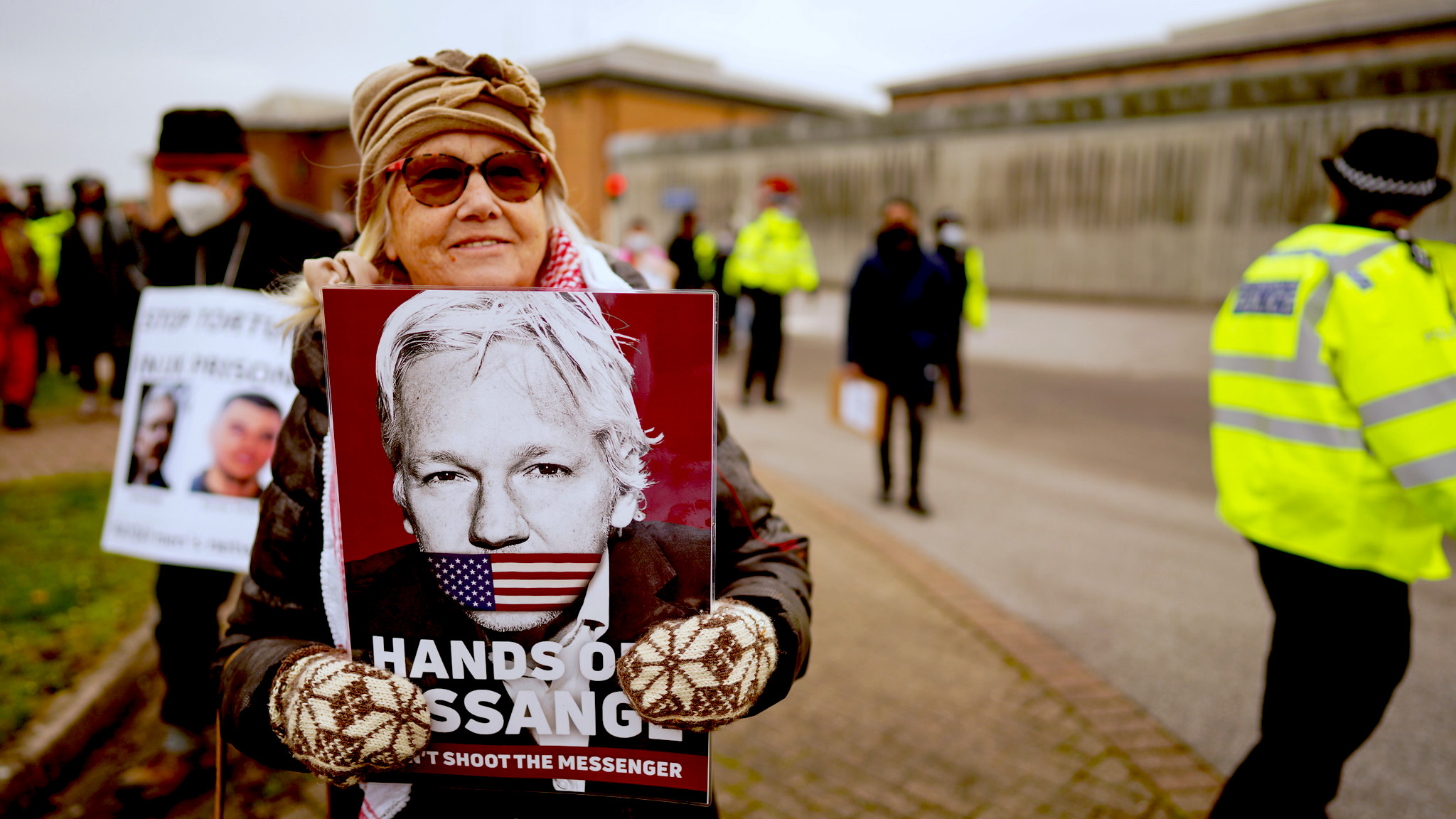
Protester outside Belmarsh Prison in London on Jan. 22, 2022. (Alisdare Hickson, Flickr, CC BY-SA 2.0)
By Jonathan Cook
Jonathan-Cook.net
 During an interview back in 2011, Julian Assange made an acute observation about the role of what he called society’s “perceived moral institutions”, such as liberal media:
During an interview back in 2011, Julian Assange made an acute observation about the role of what he called society’s “perceived moral institutions”, such as liberal media:
“What drives a paper like The Guardian or New York Times is not their inner moral values. It is simply that they have a market. In the U.K., there is a market called ‘educated liberals.’ Educated liberals want to buy a newspaper like the Guardian, and therefore an institution arises to fulfil that market. … What is in the newspaper is not a reflection of the values of the people in that institution, it is a reflection of the market demand.”
Assange presumably gained this insight after working closely the previous year with both newspapers on the Afghan and Iraq war logs.
[Related: The Revelations of WikiLeaks: No. 2 —The Leak That ‘Exposed the True Afghan War’ and No. 3—The Most Extensive Classified Leak in History]
One of the mistakes we typically make about the “mainstream media” is imagining that its outlets evolved in some kind of gradual bottom-up process. We are encouraged to assume that there is at least an element of voluntary association in how media publications form.
At its simplest, we imagine that journalists with a liberal or leftwing outlook gravitate towards other journalists with a similar outlook and together they produce a liberal-left newspaper. We sometimes imagine that something similar takes place among rightwing journalists and rightwing newspapers.
All of this requires ignoring the elephant in the room: billionaire owners. Even if we think about those owners — and in general we are discouraged from doing so — we tend to suppose that their role is chiefly to provide the funding for these free exercises in journalistic collaboration.
For that reason, we infer that the media represents society: it offers a market place of thought and expression in which ideas and opinions align with how the vast majority of people feel. In short, the media reflects a spectrum of acceptable ideas rather than defining and imposing that spectrum.
Dangerous Ideas
Of course, if we pause to think about it, those assumptions are ludicrous. The media consists of outlets owned by, and serving the interests of, billionaires and large corporations — or in the case of the BBC, a broadcasting corporation entirely reliant on state largesse.
Furthermore, almost all corporate media needs advertising revenue from other large corporations to avoid haemorrhaging money. There is nothing bottom-up about this arrangement. It is entirely top-down.
Journalists operate within ideological parameters strictly laid down by their outlet’s owner. The media doesn’t reflect society. It reflects the interests of a small elite, and the national security state that promotes and protects that elite.
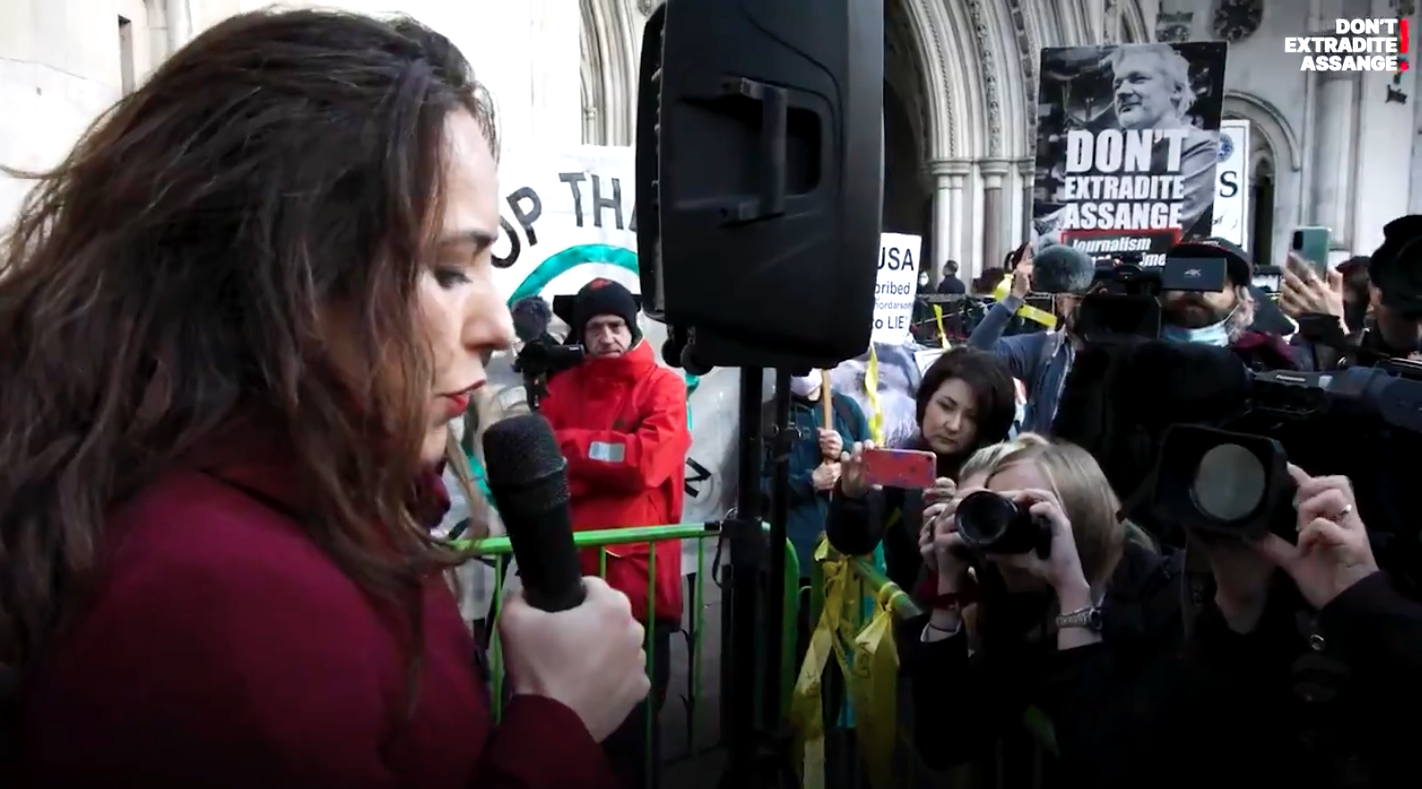
Stella Assange, Julian Assange’s wife, on Oct 28, 2021, during the U.S. appeal hearing in London. (Don’t Extradite Assange Campaign)
Those parameters are wide enough to allow some disagreement — just enough to make Western media look democratic. But the parameters are narrow enough to restrict reporting, analysis and opinion so that dangerous ideas — dangerous to corporate-state power – almost never get a look-in. Put bluntly, media pluralism is the spectrum of allowable thought among the power-elite.
If this doesn’t seem obvious, it might help to think of media outlets more like any other large corporation — like a supermarket chain, for example.
Supermarkets are large warehouse-like venues, stocking a wide range of goods, a range similar across all chains, but distinguished by minor variations in pricing and branding.
Despite this essential similarity, each supermarket chain markets itself as radically different from its rivals. It is easy to fall for this pitch, and most of us do: to the extent that we start to identify with one supermarket over the others, believing it shares our values, it embodies our ideals, it aspires to things we hold dear.
We all know there is a difference between Waitrose and Tesco in the U.K., or Whole Foods and Walmart in the U.S. But if we try to identify what that difference amounts to, it is hard to know — beyond competing marketing strategies and the targeting of different shopping audiences.
All the supermarkets share a core capitalist ideology. All are pathologically driven by the need to generate profits. All try to fuel rapacious consumerism among their customers. All create excessive demand and waste. All externalise their costs on to the wider society.
Capturing Readers
Media publications are much the same. They are there to do essentially the same thing, but they can only monetise their similarity by presenting — marketing — it as difference. They brand differently not because they are different, but because to be effective (if not always profitable) they must reach and capture different demographics.
Supermakets do it through different emphases: is it Coca-Cola or wine that serves as a loss-leader? Should green credentials and animal welfare be accentuated over value for money? It’s no different with the media: outlets brand themselves as liberal or conservative, on the side of the middle class or the unskilled worker, as challenging the powerful or respectful of them.
Support CN’s
Winter Fund Drive!
The key task of a supermarket is to create loyalty from a section of the shopping public to stop those customers straying to other chains. Similarly, a media outlet reinforces a supposed set of shared values among a specific demographic to stop readers from looking elsewhere for their news, analysis and commentary.
The goal of the corporate media is not unearthing truth. It is not monitoring the centres of power. It is about capturing readers. In so far as a media outlet does monitor power, does speak difficult truths, it is because that is its brand, that is what its audience has come to expect from it.
‘Proper’ Journalists
So how does this relate to today’s topic?
Well, not least it helps clarify something that baffles many of us. Why haven’t journalists risen up to support Julian Assange in their droves — especially once Sweden dropped the longest preliminary investigation in its history and it became clear that Assange’s persecution was, as he always warned, paving the way to his extradition to the U.S. for exposing its war crimes?
My latest: Sweden did not intend to prosecute Assange because it never had a case, writes UN expert. The aim was to trap him in an interminable process of non-prosecution while confining him in ever-worse conditions while the public was turned against him https://t.co/qGOLynClIO
— Jonathan Cook (@Jonathan_K_Cook) May 5, 2022
The truth is that, were The Guardian and The New York Times clamouring for Assange’s freedom;
had they investigated the glaring holes in the Swedish case, as Nils Melzer, the U.N.’s special rapporteur on torture, did;
were they screaming about the dangers of allowing the U.S. to redefine journalism’s core task as treason under the draconian, century-old Espionage Act;
had they used their substantial muscle and resources to pursue Freedom of Information requests, as Stefania Maurizi did on her own dime;
were they pointing out the endless legal abuses taking place in Assange’s treatment in the U.K.;
had they reported — rather than ignored — the facts that came to light in the extradition hearings in London; in short, had they kept Assange’s persecution constantly in the spotlight, he would be free by now.
The efforts by the various states involved to gradually disappear him over the past decade would have become futile, even self-sabotaging.
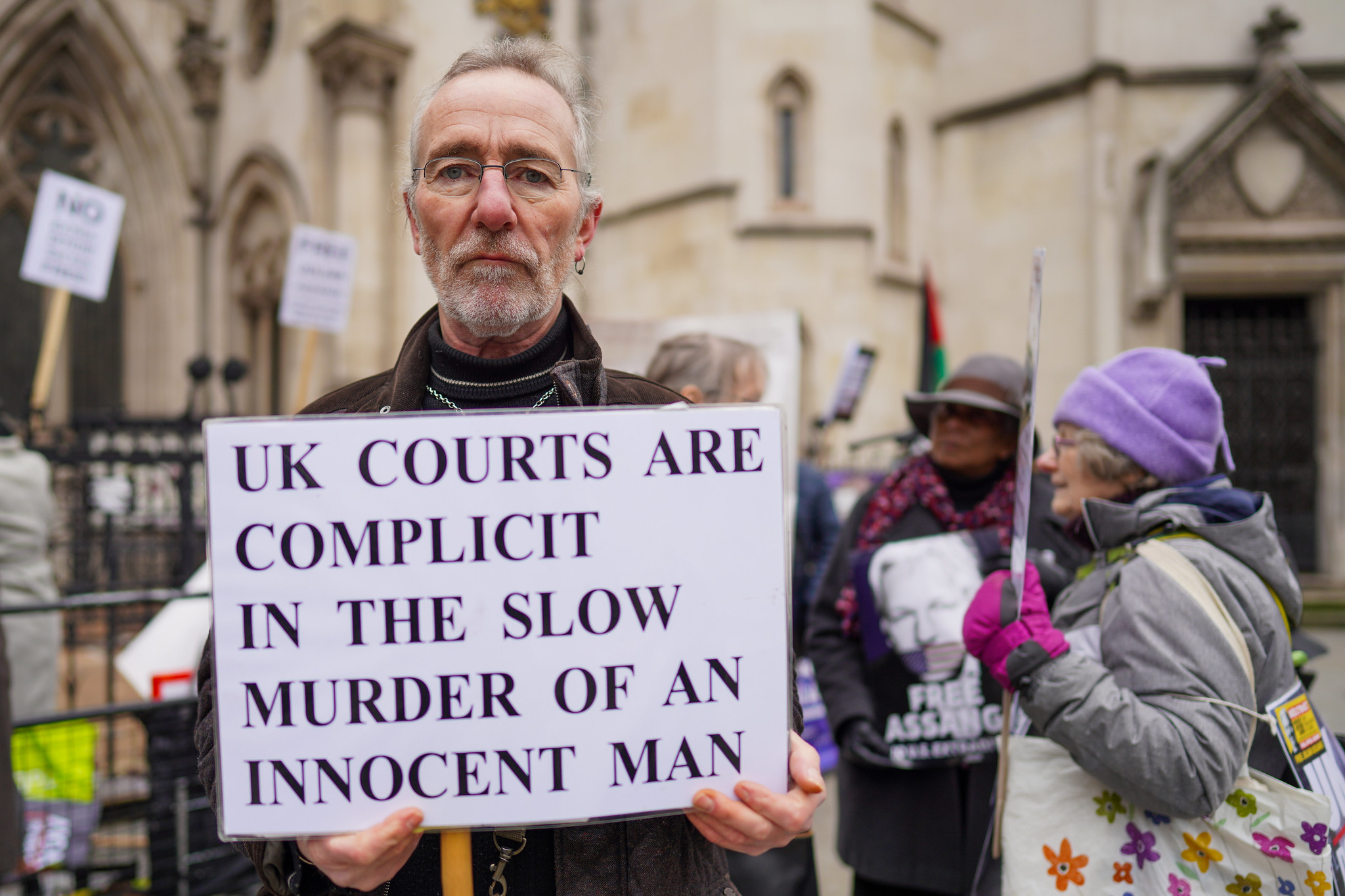
Protester outside the High Court in London on Jan. 22, 2022. (Alisdare Hickson, Flickr, CC BY-SA 2.0)
At some level, journalists understand this. Which is precisely why they try to persuade themselves, and you, that Assange isn’t a “proper” journalist. That’s why, they tell themselves, they don’t need to show solidarity with a fellow journalist — or worse, why it is okay to amplify the security state’s demonisation campaign.
By ignoring Assange, by othering him, they can avoid thinking about the differences between what he has done and what they do. Journalists can avoid examining their own role as captured servants of corporate power.
Media Revolution
Assange faces 175 years in a maximum-security prison, not for espionage but for publishing journalism. Journalism doesn’t require some special professional qualification, as brain surgery and conveyancing do. It does not depend on precise, abstruse knowledge of human physiology or legal procedure.
At its best, journalism is simply gathering and publishing information that serves the “public interest.” Public —that is, it serves you and me. It does not require a diploma. It does not require a big building, or a wealthy owner. Whisper it: any of us can do journalism. And when we do, journalistic protections should apply.
Assange excelled at journalism like no one before him because he devised a new model for forcing governments to become more transparent and public servants more honest. Which is precisely why the elite who wield secret power want him and that model destroyed.
Event at which Cook spoke:
If the liberal media was really organised from the bottom-up rather than the top-down, journalists would be incensed — and terrified — by states torturing one of their own. They would be genuinely afraid that they might be targeted next.
Because it is the practice of pure journalism that is under attack, not a single journalist.
But that isn’t how corporate journalists see it. And truth be told, their abandonment of Assange — the lack of solidarity — is explicable. Journalists aren’t being entirely irrational.
The corporate media, especially its liberal outlets and their journalist-servants, understand that Assange’s media revolution — embodied by WikiLeaks — is far more of a threat to them than the national security state.
Difficult Home Truths
WikiLeaks offers a new kind of platform for democratic journalism in which secret power, along with its inherent corruptions and crimes, becomes much harder to wield. And as a result, corporate journalists have had to face some difficult home truths they had avoided till WikiLeaks’ appearance.
First, the WikiLeaks media revolution threatens to undermine the role and privileges of the corporate journalist. Readers no longer have to depend on these well-paid “arbiters of truth.” For the first time, readers have direct access to the original sources, to the unmediated documents.
“By ignoring Assange …journalists can avoid examining their own role as captured servants of corporate power.”
Readers no longer have to be passive consumers of news. They can inform themselves. Not only can they cut out the middle man — the corporate media — but they can finally assess whether that middle man has been entirely straight with them.
That is very bad news for individual corporate journalists. At best, it strips them of any aura of authority and prestige. At worst, it ensures that a profession already held in low esteem is seen as even less trustworthy.
But it is also very bad news for media owners. They no longer control the news agenda. They can no longer serve as institutional gatekeepers. They can no longer define the limits of acceptable ideas and opinion.
Access Journalism
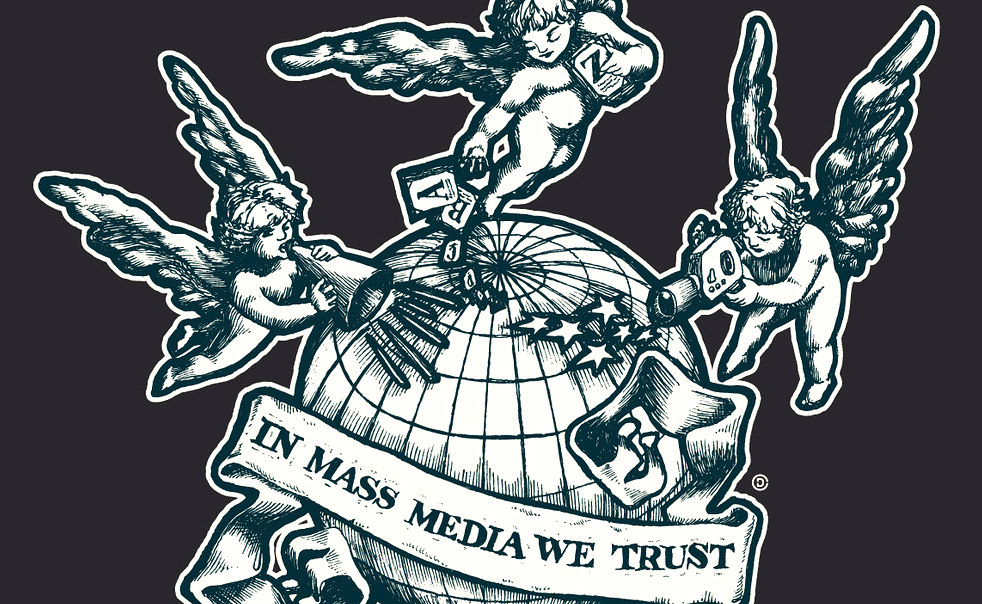
Mass Media. (Christopher Dombres, Flickr, Public domain)
Second, the WikiLeaks revolution sheds an unflattering light on the traditional model of journalism. It shows it to be inherently dependent on — and therefore complicit with — secret power.
The lifeblood of the WikiLeaks model is the whistleblower, who risks everything to get out public-interest information the powerful want concealed because it reveals corruption, abuse or lawbreaking. Think Chelsea Manning and Edward Snowden.
The lifeblood of corporate journalism, by contrast, is access. Corporate journalists make an implicit transaction: the insider delivers selected snippets of information to the journalist that may or may not be true and that invariably serve the interests of unseen forces in the corridors of power.
For both sides, the relationship of access depends on not antagonising power by exposing its deep secrets.
The insider is only useful to the journalist so long as he or she has access to power. Which means that the insider is rarely going to offer up information that truly threatens that power. If they did, they would soon be out of a job.
But to be considered useful, the insider needs to offer to the reporter information that appears to be revelatory, that holds out the promise for the journalist of career advancement and prizes.
Both sides are playing a role in a game of charades that serves the joint interests of the corporate media and political elite.
At best, access offers insights for journalists into the power plays between rival elite groups with conflicting agendas — between the more liberal elements of the power elite and the more hawkish elements.
“Both sides are playing a role in a game of charades that serves the joint interests of the corporate media and political elite.”
The public interest is invariably served in only the most marginal way: we get a partial sense of the divisions within an administration or a bureaucracy, but very rarely the full extent of what is going on.
For a brief period, the liberal components of the corporate media swapped out their historic access to join WikiLeaks in its transparency revolution. But they quickly understood the dangers of the path they were embarking on — as the quote from Assange we began with makes clear.
Mind & Muscle
It would be a big mistake to assume that the corporate media feels threatened by WikiLeaks simply because the latter has made a much better fist of holding power to account than the corporate media. This isn’t about envy. It’s about fear. In reality, WikiLeaks does exactly what the corporate media wishes not to do.
Journalists ultimately serve the interests of media owners and advertisers. These corporations are the concealed power running our societies. In addition to owning the media, they fund the politicians and finance the think tanks that so often dictate the news and policy agenda. Our governments declare these corporations, especially those dominating the financial sector, too big to fail. Because power in our societies is corporate power.
The pillars upholding this system of secret elite power — those disguising and protecting it — are the media and the security services: the mind and the muscle. The media corporations are there to protect corporate power using psychological and emotional manipulation, just as the security services are there to protect it using invasive surveillance and physical coercion.
WikiLeaks disrupts this cosy relationship from both ends. It threatens to end the role of the corporate media in mediating official information, instead offering the public direct access to official secrets. And in so doing, it dares to expose the tradecraft of the security services as they go about their lawbreaking and abuses, and thereby impose unwelcome scrutiny and restraint on them.
In threatening to bring democratic accountability to the media and the security services, and exposing their long-standing collusion, WikiLeaks opens a window on how sham our democracies truly are.
The shared desire of the security services and the corporate media is to disappear Assange in the hope that his revolutionary model of journalism is abandoned or forgotten for good.
It won’t be. The technology is not going away. And we must keep reminding the world of what Assange accomplished, and the terrible price he paid for his achievement.
This is the text of the author’s talk at #FreeTheTruth: Secret Power, Media Freedom and Democracy, held at St Pancras Church, London, on Saturday, Jan. 28 January. Other speakers were former British ambassador Craig Murray and Italian investigative journalist Stefania Maurizi, author of the recent Secret Power: Wikileaks and its Enemies. Former Labour Leader Jeremy Corbyn also presented the Gavin MacFayden award, the only media prize voted on by whistleblowers, to Julian Assange for being “the journalist whose work most exemplifies the importance of a free press.” Craig Murray accepted it on Assange’s behalf.
Jonathan Cook is an award-winning British journalist. He was based in Nazareth, Israel, for 20 years. He returned to the U.K. in 2021.He is the author of three books on the Israel-Palestine conflict: Blood and Religion: The Unmasking of the Jewish State (2006), Israel and the Clash of Civilisations: Iraq, Iran and the Plan to Remake the Middle East (2008) and Disappearing Palestine: Israel’s Experiments in Human Despair (2008) If you appreciate his articles, please consider offering your financial support.
This article is from the author’s blog Jonathan Cook.net.
The views expressed are solely those of the author and may or may not reflect those of Consortium News.
Support CN’s
Winter Fund Drive!
Donate securely by credit card or check by clicking the red button:

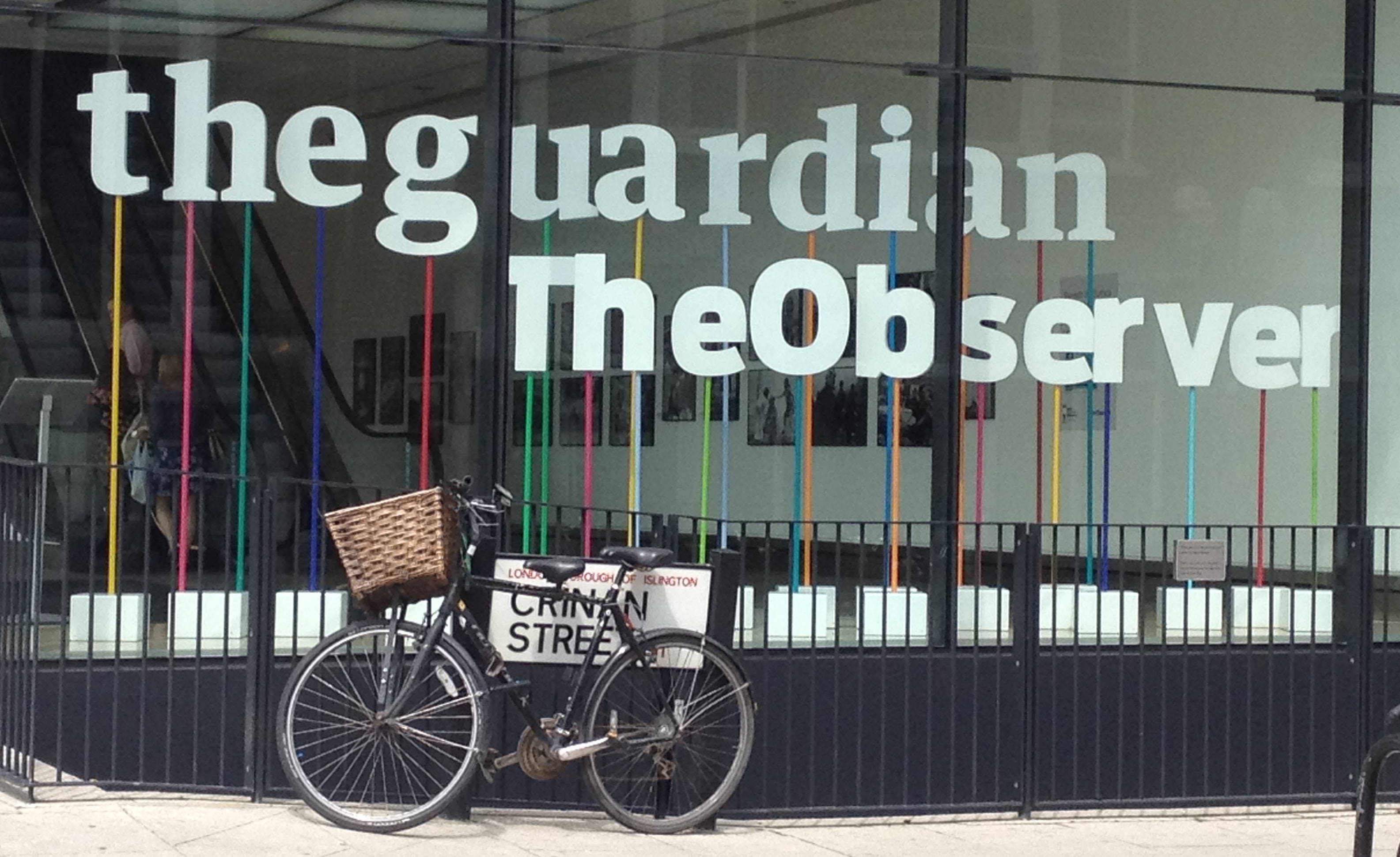

The Australian Parliament sits from this coming Monday 8 March – two days from now.
Even though the “Bring Julian Assange Home Parliamentary Support Group” numbers 40, the major parties on both sides have, so far, successfully colluded to prevent any substantial discussion, on the floors of either the House of Representatives or the Senate, about the treatment of Julian Assange and successive governments’ [mis]handling of his case.
This must end. A modest start will occur during the next sitting:
Independent member Monique Ryan will be asking Prime Minister Anthony Albanese to explain why, contrary to his claims made to her during a previous Question Time on 30 November 2022 (hxxs :// candobetter.net/admin/blog/6513/video-parliament-will-government-intervene-bring-mr-assange-home-dr-monique-ryan), a FOI request has revealed that, for six months, there is no written record of an Australian government department official having been in contact with any US government official over Julian Assange.
However, when the time allowed in Question Time for each question and response is two minutes, much more is needed than a question or two even by an MP as capable as Monique Ryan. A proper debate on the floors of Parliament, in which the case for government action to free Julian Assange can be put, is urgently needed.
“Arguing that you don’t care about the right to privacy because you have nothing to hide is no different than saying you don’t care about free speech because you have nothing to say.”
? Edward Snowden
This is a superb exposé of how our (overwhelmingly) corporate media function. As the author writes, media exist not to unearth the truth but to reflect back to their readerships the views of the élites who are invested in maintaining the status quo that undergirds their power. “Journalists” who adhere to this mission are rewarded; those who stray from the path are silenced or lose their careers if their writings venture outside “the spectrum of allowable thought among the power-elite.”
A factual issue: “The media consists of outlets owned by, and serving the interests of, billionaires and large corporations.” For the most part, yes; but last I heard, both the Guardian and the Independent were staff-owned nonprofits. Has that changed? I suppose Cook is in a position to know.
Of course, that doesn’t change their dependence on advertising, which in turn makes them dependent on large corporations, But in principal, at least, it should make them significantly more independent. Not that that’s been evident in their treatment of Assange.
The remaining staff has been bought. The more ethically driven founders have departed. Those who remain enjoy the lucrative rewards of prostituting themselves to the same oligarchy who own the corporate media. Thus, their journalism remains within the same limited guidelines that support the views of the oligarchy but are shaped to appeal to their liberal readers.
sigh—-It’s as if modern media seeks to lead the parade , to create the drama , to pretend to know—–And while they may well know—they won’t tell the truth. This is so much like the novel 1984—and that in itself is a horror. As far as I can tell, there is only one truly honest man on the planet—-and that is Julian Assange.
And CaseyG, it is a true disgrace that jounalists en masse (excepting those brave enough) are not calling out this heinous act on human rights. But as you rightly noted, we are being manipulated “à la” George Orwell’s 1984.
FREE JULIAN ASSANGE
Bravo! What a perfect time in which to bring under bright and damning light the mainstream media of the West. No need to mention Ukraine explicitly because it’s right there under our noses (especially in Germany where criticism of the Western narrative is actually illegal, but most other Western nations have sufficient control to make non-mainstream-news criticism ineffective across their general population).
Take PBS in the U.S. (take it and throw it away save for its British comedies and uncontroversial science-human-animal-interest material). For the past year its Ukraine coverage has solely covered the nationalist Ukrainian narrative without reference to what constituted well-documented events 9 (and many more) years ago that formed the basis for the current situation which the U.S. carefully engineered. It might be nice to think that Judy Woodruff’s departure from leading its News Hour arose from .terminal disgust at what has passed for news coverage in this area but since she was actively complicit in deciding what to cover and how to cover it that would require a great deal of naivete.
Such journalistic perfidy goes far beyond Judith Miller’s NYT whitewashing of the 2003 Iraq invasion two decades ago, perhaps because other somewhat mainstream venues still maintained some semblance of independence back then – but not now: their performance today mirrors PBS’s (dare I mention the only cold-day-in-hell notable exception seemingly being Fox’s Tucker Carlson who may be too popular to censor?).
The above Ukraine examples are hardly off-topic for an article which focuses less on Assange personally but on mainstream media and why they don’t support him or Wikileaks. They simply emphasize how important alternative media are to any pretense of democracy.
Thanks for mentioning PBS and the depated anchor, Ms. Woodruff. As the “unprovoked attack” on Ukraine unfolded in Feb. 2022, each evening I watched both BBC and PBS news tell me what was happening. And each morning I read CN and two other valued sources whose reports were quite different than the evening news – completely different versions. My blood boiled then, now, it merely simmers, as I witness the deciet play out night after night. Many I know still believe the dominant decietful narratives, seemingly ignoring the peril of this moment. Thank you.
Tucker Carlson remains, not because of his popularity but because he has mastered the art of what this article addresses. He has mastered the art of appearing to report the news while staying well within the Murdoch guidelines. If he were ever to step over that line, Murdoch would not wait for a second to replace him.
Wonderful talk here delivered by Cook. The themes are not revelatory, but, he spells it all out in a compelling and direct manner. I’d send it on to a couple of friends who, out of habit, rely on corporate outlets for their, er, ‘news’. But, I ceased sending links/discussing all political matters with them. There are no common reference points – it’s as if we’re speaking two different languages.
The persecution of Assange all these years stands as a singular example of how the ruling elite regard any threat of exposure of the inner workings of the Empire. WE are all Julian Assange. WE are all a threat to the ruling elite.
Yet back in the day when we first found out how much we were being surveilled, and complained about it, the popular response was, “If you’re not doing anything wrong, why do you care?”